Related Research Articles

Land reform is a form of agrarian reform involving the changing of laws, regulations, or customs regarding land ownership. Land reform may consist of a government-initiated or government-backed property redistribution, generally of agricultural land. Land reform can, therefore, refer to transfer of ownership from the more powerful to the less powerful, such as from a relatively small number of wealthy or noble owners with extensive land holdings to individual ownership by those who work the land. Such transfers of ownership may be with or without compensation; compensation may vary from token amounts to the full value of the land.

Yoweri Kaguta Museveni is a Ugandan military officer, politician and revolutionary who has served as the ninth president of Uganda since 1986. His government is considered autocratic. After Museveni lost the election of 1980, he started the Ugandan Bush War which caused over 100,000 deaths and led to the removal of Milton Obote.
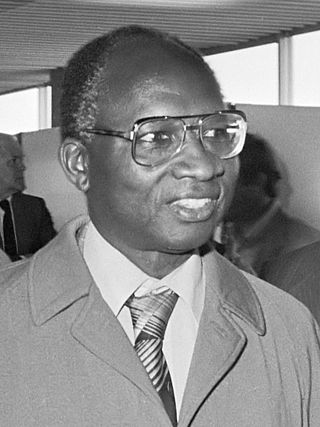
Sir Dawda Kairaba Jawara was a Gambian politician who served as Prime Minister from 1962-70, and then as the first President of the Gambia from 1970-94.
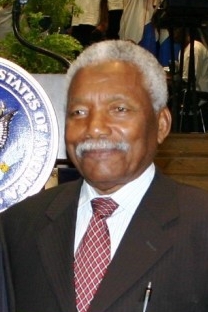
Ali Hassan Mwinyi is a Tanzanian politician, who served as the second President of the United Republic of Tanzania from 1985 to 1995. Previous posts include Interior Minister and Vice President. He also was chairman of the ruling party, the Chama Cha Mapinduzi (CCM) from 1990 to 1996.
Dependency theory is the idea that resources flow from a "periphery" of poor and underdeveloped states to a "core" of wealthy states, enriching the latter at the expense of the former. A central contention of dependency theory is that poor states are impoverished and rich ones enriched by the way poor states are integrated into the "world system". This theory was officially developed in the late 1960s following World War II, as scholars searched for the root issue in the lack of development in Latin America.

Sam Kahamba Kutesa is a Ugandan politician, businessman and lawyer involved in several corruption cases. By the marriage of his daughter Charlotte Kutesa Muhoozi with Muhoozi he is part of the inner circle of president Museveni. Kutesa was the Minister of Foreign Affairs in the Cabinet of Uganda, a position he held from 13 January 2005 and maintained through three cabinet reshuffles until May 2021. He was also the elected Member of Parliament (MP) for Mawogola County in Sembabule District. He was the President of the United Nations General Assembly during its 69th session in 2014–2015.
Bono State was a trading state created by the Bono people, located in what is now southern Ghana. Bonoman was a medieval Akan kingdom in what is now Bono, Bono East and Ahafo region respectively named after the and Eastern Ivory Coast. It is generally accepted as the origin of the subgroups of the Akan people who migrated out of the state at various times to create new Akan states in search of gold. The gold trade, which started to boom in Bonoman as early in the 12th century, was the genesis of Akan power and wealth in the region, beginning in the Middle Ages.

Andrew Mwenda is a Ugandan print, radio and television journalist, and the founder and owner of The Independent, a current affairs newsmagazine. He was previously the political editor of The Daily Monitor, a Ugandan daily newspaper, and was the presenter of Andrew Mwenda Live on KFM Radio in Kampala, Uganda's capital city.
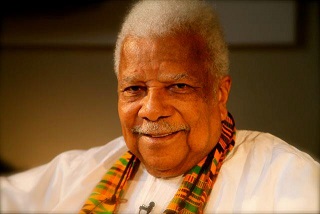
Ali Al'amin Mazrui, was a Kenyan-born American academic, professor, and political writer on African and Islamic studies, and North-South relations. He was born in Mombasa, Kenya. His positions included Director of the Institute of Global Cultural Studies at Binghamton University in Binghamton, New York, and Director of the Center for Afro-American and African Studies at the University of Michigan. He produced the 1980s television documentary series The Africans: A Triple Heritage.
David William Cohen is Emeritus Professor of History and Anthropology at the University of Michigan. He specializes in East Africa and is a leader in the emerging field of historical anthropology. He is Honorary Research Fellow, Archive and Public Culture Initiative, University of Cape Town.
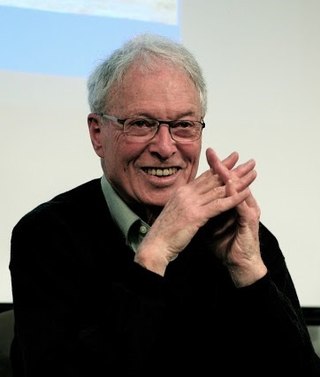
Colin Temple Leys is a British political economist who is emeritus professor of political studies at Queen's University, Canada, and an honorary research professor at Goldsmiths, University of London. From 1956 to 1960 he taught at Balliol College, Oxford and then became the first Principal of Kivukoni College in Dar es Salaam, before holding chairs at Makerere University, Uganda, and the universities of Sussex, Nairobi, Sheffield, and Queen's. Until his retirement from Queen's in 1996 his research focussed mainly on African development. He has since worked mainly on the political economy of Britain, but from 1997 to 2010 he was co-editor with Leo Panitch of the Socialist Register. From 2000 onwards he became involved in the defence of the British National Health Service (NHS) against successive government attempts to marketise and privatise it. With Stewart Player he co-authored two books on the NHS and was one of the founders of a respected think tank, the Centre for Health and the Public Interest.
Clientelism or client politics is the exchange of goods and services for political support, often involving an implicit or explicit quid-pro-quo. It is closely related to patronage politics and vote buying. Clientelism involves an asymmetric relationship between groups of political actors described as patrons, brokers, and clients. In client politics, an organized minority or interest group benefits at the expense of the public. Client politics may have a strong interaction with the dynamics of identity politics. This is particularly common in a pluralist system, such as in the United States, where minorities can have considerable power shaping public policy. The opposite of client politics is 'entrepreneurial' politics, or conviction politics.

Ernest Aryeetey, is the secretary-general of the African Research Universities Alliance (ARUA) and a former vice-chancellor of the University of Ghana. Prior to his appointment as vice-chancellor, he was a senior fellow and director of the Africa Growth Initiative at the Brookings Institution, Washington, D.C. He was also director of the Institute of Statistical, Social and Economic Research (ISSER) of the University of Ghana, Legon for the period February 2003 to January 2010.

Corruption in Uganda is characterized by grand-scale theft of public funds and petty corruption involving public officials at all levels of society as well as widespread political patronage systems. Elite corruption in Uganda is through a patronage system which has been exacerbated by foreign aid. Aid has been providing the government with large amounts of resources that contribute to the corrupt practices going on within the country. The style of corruption that is used is to gain loyalty and support so that officials can remain in power. One of the more recent forms of corruption is through public procurement because of the lack of transparency with transactions that happen within the government.
Ghost soldiers or ghost battalions refers to army troops whose names appear on military rolls, but who are not actually in military service, generally in order to divert part of the soldiers' salaries to an influential local entity such as army officers or others. Soldiers may equally benefit from the corruption scheme by returning to their civilian occupation and routine while gaining marginal income. The practice, however, weakens the military and makes it susceptible to military offensives and major defeats since leaders ignore the true number of available troops at their disposal on various front-lines. Severe occurrences of ghost soldiers have been cited in Vietnam, Iraq, Afghanistan and other countries with dramatic military, humanitarian and historic consequences.
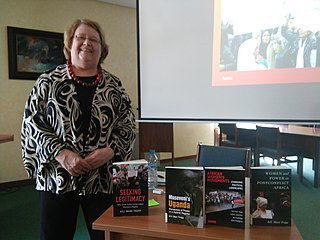
Aili Mari Tripp is a Finnish and American political scientist, currently the Wangari Maathai Professor of Political Science and Gender and Women's Studies at the University of Wisconsin-Madison.
Ivor Agyeman-Duah is a Ghanaian academic, economist, writer, editor and film director. He has worked in Ghana's diplomatic service and has served as an advisor on development policy.
Takyiwaa Manuh is Ghanaian academic and author. She is an Emerita Professor of the University of Ghana, and until her retirement in May 2017, she served as the Director of the Social Development Policy Division, of the United Nations Economic Commission for Africa (ECA), located in Addis Ababa, Ethiopia. She was also the Director of the Institute of African Studies, University of Ghana from 2002 to 2009. She is a fellow of the Ghana Academy of Arts and Sciences.
Professor Emmanuel Gyimah-Boadi is a Ghanaian political scientist and the co-founder of the Afrobarometer, a pan-African research project that surveys public attitude on political, social and economic reforms across African countries. He was the CEO of Afrobarometer from 2008 to 2021. He is now the chair of its board of directors.
Douglas Rimmer was an economist and historian focusing on post-colonial West Africa. He first taught at the University College of the Gold Coast and was a founding member of the Centre of West African Studies at Birmingham University in 1963, where he became Director in 1983. Rimmer served the Royal African Society (RAS) for twenty years in various roles such as President (1986-1988). In 2001 he received the RAS/ASAUK Distinguished Africanist Award.
References
- ↑ Noble, Kenneth B. (24 June 1991). "Ghana Falters After Years of Growth". New York Times . Retrieved 19 October 2009.
- ↑ "Visiting Scholars". Archived from the original on 9 January 2012.